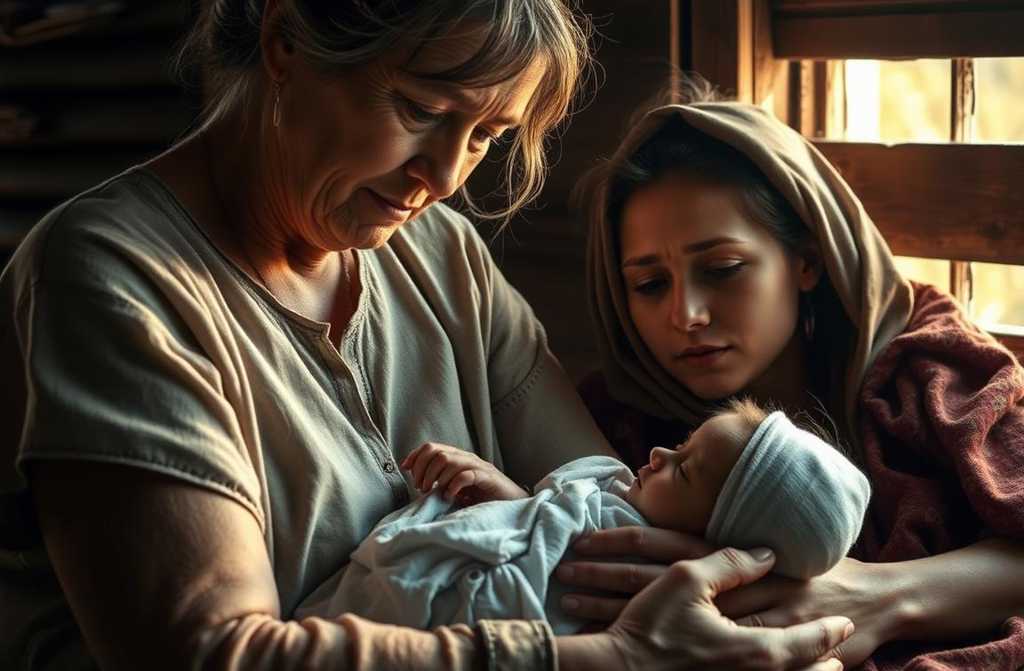**A Stepmothers Heart**
Not long ago, the wedding bells had rung. Just recently, the family had gathered together, singing, dancing, and merrymaking, with no one suspecting it might be their last reunion. Only the grooms mother, Edith, sat sullenly. She had taken an instant dislike to the delicate, slender brideso pretty, yes, but what use was beauty when she could barely lift a bundle of sticks or carry a full pail? Edith had laboured all her life, expecting her son to marry a sturdy girl, someone to take her placenot this wisp of a thing who seemed more burden than help. She stewed in her resentment, and young Margaret, the bride, couldnt ignore the older womans silent fury.
Her husband, William, tried to comfort her but warned his mother wouldnt go easy. Edith despised frailtystrength was in broad shoulders, calloused hands, a brisk stride. Shed once dragged her drunken husband to bed single-handedly. When she hitched a horse, stablehands stepped aside. Behind a plough, her back stayed straight, her grip firm, turning the earth in glossy, even furrows. At haymaking, she could stack a rick in an hour while others fumbled half a day for a measly pile.
God had given her a mans strength and withheld a womans tenderness. Margarets own mother hadnt wanted her to marry into such a house. They lived nearby, and Helen had long marvelled at Ediths brute forcehow shed rethatched the roof alone, ploughed fields, built hayricks. What sort of daughter-in-law could ever satisfy her?
Yet Margaret wouldnt listen. She thought time would soften Edith, that shed dote on grandchildren while Margaret and William ran things their own way. “As if Id give up the man I love over her,” she scoffed.
No one knew war loomed, that joy would soon give way to parting. Six months after the wedding, it came. That half-year had felt like a trial. William doted on his wife, shielding her from chores, which only stoked Ediths scorn. “What sort of man wont let his wife lift a pail? Always coddling hertakes after his useless father.”
Ediths own mother had wed her to a widower whose wife had died of fever. Theyd been destitute, their straw roof leaking, livestock gone. The groom was meek, a quiet drunk, but he had a cow and a horsewhat more did a starving woman need?
Exhausted from raising his child alone, Thomas was glad for any replacement. Hed eyed Ediths rough features, her towering frame, and grunted, “Shell do as a housewife.”
For weeks, neither spoke. Only the toddler clung to Ediths skirts, begging to be held, smiling up at her. In time, she became a fine managerbut she never loved her husband. Nor did he offer affection. Her only joy was the boys devotion.
She grew into motherhood, if not marriage. Shed talk for hours with William, teaching him patience and toil, rewarding obedience with fierce hugs and kisses. Of course, thered been the strap tooone warning, then leather on his backside. Shed weep afterward, and theyd forgive each other.
William grew kind, handsome, devoted. When Thomas died, they hardly mourned. Edith clasped her sons hands. “Thank God for you. I never wanted to be a stepmotherI tried to be a mother.”
Her smile softened her rugged face, warmth lighting her eyes. Shed hug him tight, murmuring, “Time flies, lad. Youll marry, bring home a strong, clever girl. Well build a new housesave me a corner, eh? Someones got to keep things in order.”
William would grin, thinking, *My beautiful, fierce mother. Ill never fail her like Father did.*
Then came the war.
Edith slumped after seeing him off, wailing into her apron. Margaret, weeping too, tried to comfort her. “Dont fuss over me,” Edith snapped. “Pray he comes home. Hes my life. Without him, Ive nothing.”
The waiting was agony. To Edith, Margaret was helplesscarrying half-buckets of water, struggling to knead dough, fumbling at milking. Each time she lifted the heavy iron pot from the hearth, Ediths heart lurched. “Useless girl,” shed mutter. “Shouldve stayed unwed.” Yet Margaret saw no maliceonly fear masked as scolding.
One morning, Edith noticed Margaret nibbling pickles to quell nausea. She knew the signs.
Hunger crept closer each day. Edith had hidden flour, salt, sugar in the attic, but war respected no preparations.
Margaret weakened, barely able to hold a spoon. Edith tried everythingsalted bread, pickled apples, sweet teabarking, “Sit still if you cant work!”
Williams letters always began, *”Dearest Mother and Margaret.”* Edith would kiss the page, weeping, but forbade Margaret to mention the baby. “I lost mineyoure too frail. Wait till its born.”
Margarets belly swelled, though she ate little. Dizziness plagued her. She dreamed of Williams return, of presenting him with a son.
Then the letters stopped.
Edith knelt nightly, begging God: *”Take my strength, my couragegive them to my boy. Spare him. And help Margaret when her time comes.”*
No word came. Each day, they hopedtomorrow, perhaps. Edith withered, her powerful frame gaunt. Margaret watched her sip milk before dawn, then labour all day at the farm.
When the pains began, Margaret called for her. The midwife refused to staywind howled, roofs tore. Edith hitched the cart, bundled Margaret inside, and drove through the storm.
The birth was torment. For hours, life and death wrestled. Then a crya healthy boy. Margaret, drained from blood loss, barely clung to consciousness.
Her mother offered to take her home. Edith, grey and stooped, stood like a scolded child. Margaret met her gazegratitude in one, pleading in the other. *”Ill stay with the mother who saved us.”*
Joy straightened Ediths spine. She cut up her husbands shirts for the baby, used her burial linen for swaddling. “No need to dress fancy for the afterlife,” she joked.
Margaret didnt mind. Shed once feared Ediths glare, her heavy treadnow she saw the gentle hands, the sly tenderness. She thanked her often, making Edith blush. “Hush now. Just suckle that boy stronghis fathers coming home.”
Still, no letters. But no death notice either.
Thenpeace.
Villagers returned. William did not.
One summer day, little John scampered outside, kicking up dust. He bumped into a soldiers legs, looked upand found his father.
William trembled as he held the boy, then sprinted home. Edith wailed; Margaret leaned into his chest. “We never doubted youd come back.”
“I knew too,” he said. “Our son met me at the gate.” Hed been a scout, he explainedthats why he couldnt write.
Edith watched her family and thought: *Happiness isnt just feltits held. Its you, my son, and all you love.*







